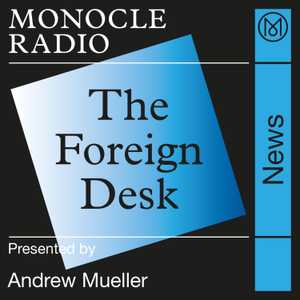17 March 2021
05 minutes
Photo: Shutterstock
After over six years of a split government, Libyans are now looking forward to a new united leadership headed by interim prime minister, Abdul Hamid Dbeibeh. Andrew Mueller explains whether Dbeibeh’s promises are enough to fix the fractured country.
17 March 2021
Share episode
DownloadWant more radio episodes like these in your inbox?
Sign up to Monocle’s email newsletters to stay on top of news and opinion, plus the latest from the magazine, radio, film and shop.
The Foreign Desk - latest episodes
Explainer 427: Bangladesh’s quota quandary
Andrew Mueller explains why there have been deadly protests across Bangladesh.
Is America the north star it used to be?
In this special episode, recorded partially in Washington during the Nato Summit, we take a look at the United States’ willingness and ability to assume its traditional role as leader of the free world in this pivotal era…
Explainer 426: JD Vance
Ohio senator JD Vance has been announced as Donald Trump’s running mate and potential vice-president. Andrew Mueller explains his background and the likely reasons for his nomination.
Nato comes to Washington
‘The Foreign Desk’ broadcasts from Washington for Nato’s 75th anniversary summit, with Joe Biden playing host under an intense spotlight. Andrew Mueller speaks to ministers from Estonia, Latvia and Moldova, as well as Ian…
Explainer 425: Is this the end of Ecowas?
Andrew Mueller explains why the West African junta have turned their back on Ecowas and what it means for the bloc.
How will Keir Starmer relate to the world?
The UK sees its first change in government since Brexit. We explore how Keir Starmer will tackle relations with the EU, US and Middle East, as well as asylum policy. Andrew Mueller speaks with Claire Ainsley, Anand Menon…
Explainer 424: Replacing Joe Biden
Andrew Mueller explains how the Democratic Party would replace Joe Biden should he choose to step down.
What does Iran want?
Iran’s influence is growing across the Middle East, with its proxies now dangerously close to an all-out war with Israel. Could presidential elections or an eventual ayatollah succession lead to a change in course? Andrew…
Explainer 423: Will Ukraine and Moldova ever join the EU?
The European Union formally launched accession negotiations with Ukraine and Moldova this week. Andrew Mueller explains why the tortuous process that has left many countries in limbo might, nevertheless, be a good thing for…
What will it take to achieve peace in Ukraine?
The Ukraine peace summit did not lead to peace but it did surprise on the upside with more than 90 countries. Andrew Mueller was also in attendance in Switzerland. He reviews the summit’s tangible results and speaks to…
Explainer 422: Friends with benefits
As Vladimir Putin visits Kim Jong-un, Andrew Mueller explains why a warm relationship is so advantageous for both Russia and North Korea.
Can the far-right govern in Europe?
Voting for the far-right is no longer merely a protest for many. After the EU elections, we look at who can govern effectively, and who can be defeated. Andrew Mueller speaks with Sophie Pedder in France, Marilisa Palumbo…
Explainer 421: Israel and the UN
Andrew Mueller explains whether Israel’s prime minister, Benjamin Netanyahu, will adhere to the UN Security Council resolution and if he even has much of a choice.
India and its neighbours
Narendra Modi has secured a third term as India’s prime minister despite losing more votes than expected in the country’s election. We explore Modi’s foreign-policy doctrine and his testy relationship with Pakistan, China…
Explainer 420: Claudia Sheinbaum
Mexico has elected its first female president, Claudia Sheinbaum. But, as Andrew Mueller explains, she has really been elected to continue the legacy of the incumbent president, Obrador.

















